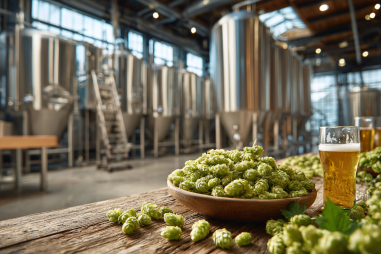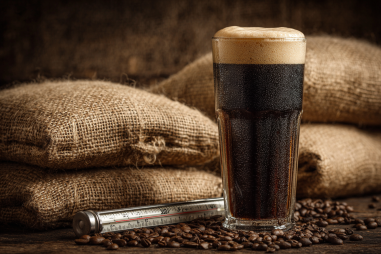American sour beers have gained a cult following not just for their tart, complex flavors but also for their potential health benefits. These unique brews undergo a fermentation process involving wild yeast and bacteria, which may introduce probiotics similar to those found in fermented foods like yogurt and kimchi. But are these benefits truly significant when it comes to enjoying a glass of sour beer? Let’s dive into what makes sour beers distinctive, explore the science behind their health effects, and learn how to enjoy them responsibly.
Understanding Probiotics and Fermented Foods
Probiotics are live microorganisms, often called “good bacteria,” that can provide health benefits when consumed in adequate amounts. They play a crucial role in maintaining the balance of gut microbiota—the vast community of bacteria living in our digestive tract. A healthy gut microbiome supports digestion, immune function, and even influences mood and mental health.
Fermented foods have been a dietary staple in many cultures around the world and are an excellent source of probiotics. Classic examples include yogurt, sauerkraut, kimchi, miso, and kefir. The fermentation process involves bacteria and yeast breaking down sugars and other compounds, which not only makes the foods more digestible but also enriches them with beneficial microbes and bioactive compounds.
Sour beers fall under the broad umbrella of fermented foods and beverages, and that’s where the potential health benefit story begins.
What Makes Sour Beers Potentially Beneficial?
Sour beers, especially American styles like American Wild Ales and Berliner Weisse, distinguish themselves by incorporating wild yeast strains such as Brettanomyces and various lactic acid bacteria like Lactobacillus and Pediococcus. Unlike traditional beers brewed with standard brewer’s yeast (Saccharomyces cerevisiae), these mixed-culture fermentations create complex sour and funky flavors but also introduce live bacteria during the fermentation process.
These live microorganisms have the potential to survive into the final product, meaning sour beers may contain probiotic-like bacteria similar to those found in other fermented foods. The presence of these microbes is what differentiates sour beers from standard lagers or ales, which are usually pasteurized or filtered to remove live yeast and bacteria.
Beyond microbes, sour beers are lower in bitterness and often contain organic acids such as lactic acid, which can aid digestion by stimulating acid production in the stomach. They also typically have lower alcohol by volume (ABV) compared to many modern craft beers, making them a potentially lighter choice when consumed in moderation.
Scientific Research on Sour Beers and Gut Health
While fermented foods and probiotic supplements have been extensively studied for their health benefits, focused research on sour beers is more limited but growing. Some preliminary studies and expert opinions suggest that sour beers could contribute positively to gut health thanks to their live bacteria and bioactive compounds.
One important consideration is whether the probiotics remain viable by the time the beer is consumed. Studies on fermented beverages like kombucha and kefir show that live microbes can survive through the digestive tract to provide benefits. Sour beers, especially unfiltered or minimally pasteurized ones, are more likely to contain live bacteria that reach the gut.
Research also points out that the specific strains found in sour beers, such as lactic acid bacteria and Brettanomyces, can interact with the gut microbiota differently than strains in dairy-based probiotics. These microbes may offer unique metabolic and digestive benefits, though more controlled human studies are needed to fully understand their impact.
Some brewers and scientists emphasize the importance of the overall drinking context—enjoying sour beers as part of a diverse, balanced diet rich in fiber and fermented foods is key to supporting healthy gut flora.
Moderate Consumption and Health Considerations
As with any alcoholic beverage, moderation is crucial when considering the health effects of sour beers. While the probiotics and organic acids found in these brews may offer benefits, alcohol can negatively affect gut lining and microbiota balance when consumed excessively.
The general recommendation is to limit alcohol consumption to one drink per day for women and up to two drinks per day for men. Exceeding this amount can increase risks for liver disease, digestive issues, and other health problems that overshadow the potential probiotic advantages.
Individuals with certain health conditions, such as those with compromised immune systems, pregnant people, or those taking specific medications, should consult healthcare professionals before consuming fermented alcoholic products like sour beer.
It’s also worth noting that sour beers may contain histamines and other compounds that can trigger sensitivities or allergic reactions in some people.
Common Myths and Facts About Sour Beer Health Effects
- Myth: Sour beers are a magic cure for digestive issues.
Fact: While they contain live bacteria and acids that could support gut health, sour beers are not a substitute for a healthy diet or medical treatment. - Myth: All sour beers contain probiotics.
Fact: Not all sour beers contain live probiotics. Pasteurization and filtration methods can eliminate live bacteria. Look for unfiltered, bottle-conditioned sour beers to maximize probiotic potential. - Myth: You can drink unlimited amounts of sour beer for health.
Fact: Excessive alcohol consumption harms gut health and overall wellness, negating any probiotic benefits. - Myth: Sour beer probiotic strains are identical to those in probiotic supplements.
Fact: The strains in sour beers can differ and their health effects aren’t as well studied or standardized as commercial probiotics.
How to Enjoy Sour Beer Responsibly
Enjoying sour beers for their taste and potential health perks requires a mindful approach. Here are some helpful guidelines:
- Choose unfiltered and bottle-conditioned sour beers: These are more likely to contain live bacteria and probiotics.
- Drink in moderation: Stick to recommended alcohol intake guidelines to balance enjoyment with health.
- Pair with a balanced diet: Incorporate other fermented foods and fiber-rich foods to support overall gut health.
- Store properly: Refrigerate sour beers to maintain the viability of live microbes.
- Experiment with styles: Explore various American sour beer styles like American Wild Ales, Berliner Weisse, and Gose to find your favorites.
- Listen to your body: If you notice any adverse reactions or digestive discomfort, consult a healthcare professional.
Remember, the joy of sour beers lies in their unique flavor profiles and brewing artistry as much as any potential health effect.
Balancing Health and Enjoyment with American Sours
American sour beers offer a fascinating combination of bold flavors and the possibility of health-supportive probiotics. While the scientific community continues to explore the specific health benefits of these beers, the existing evidence highlights benefits linked to live bacteria and organic acids found in fermented foods and beverages.
By drinking sour beers thoughtfully and as part of a balanced lifestyle, beer lovers can savor their tart complexity while supporting gut health to some extent. Like many foods and drinks, the key lies in moderation and informed choices.
So next time you raise a glass of your favorite American sour beer, relish its funkiness and know there might also be a little probiotic magic in that bottle—just don’t forget to drink responsibly and enjoy the journey.







